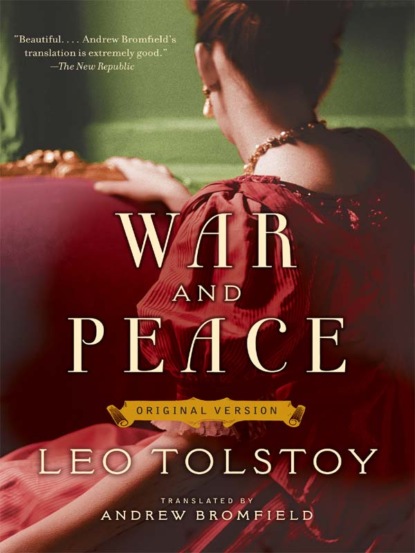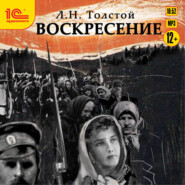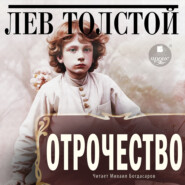По всем вопросам обращайтесь на: info@litportal.ru
(©) 2003-2024.
✖
War and Peace: Original Version
Автор
Год написания книги
2019
Настройки чтения
Размер шрифта
Высота строк
Поля
“Kiss me here.” He pointed to his cheek. “Thank you, thank you.”
“What are you thanking me for?”
“For not putting things off, not clinging to a woman’s skirt. Duty above everything. Thank you, thank you!” And he carried on writing so that splashes of ink flew from his creaking pen. “If there is something you need to say, say it. I can do these two things at the same time,” he added.
“About my wife … I already feel guilty for leaving a pregnant woman on your hands …”
“Don’t tell lies. Say what you want to say.”
“When the time comes for my wife to give birth, during the final days of November, send to Moscow for the accoucheur… Let him be here.”
The old prince stopped what he was doing and fixed his son with a strict eye, as if he did not understand.
“I know that no one can help, if nature will not,” said Prince Andrei, clearly embarrassed. “I agree that out of a million cases, only one turns out badly, but it is our fantasy, hers and mine. They have said things to her, she has seen it in a dream, and she is afraid.”
“Hm … hm …” the old prince mused to himself, carrying on writing. “I will do it.” He dashed off his signature, suddenly turned quickly towards his son and laughed. “A bad business, eh?”
“What is bad, father?”
“The wife!” said the old prince with curt emphasis.
“I do not understand,” said Prince Andrei.
“But there is nothing to be done, my friend,” said the prince, “they are all like that, you can’t get unmarried again. Don’t worry, I won’t tell anyone, but you know it yourself.”
He took hold of his son’s hand with his own bony little hand, shook it, glanced straight into his son’s face with his quick, lively eyes that seemed to see right through people, and laughed his cold laugh again.
The son sighed, confessing with this sigh that his father had understood him. The old man continued folding and sealing letters, grabbing up and throwing down the sealing wax, seal and paper with his customary rapidity.
“It can’t be helped. She’s a beauty! I will do everything. Don’t you worry,” he rattled out during the process of sealing.
Andrei said nothing; he was glad to know that his father had understood him. The old man stood up and held out a letter to his son.
“Listen,” he said, “do not concern yourself about your wife: everything that can possibly be done, will be done. Now listen: give this letter to Mikhail Illarionovich. I have written that he should place you somewhere really useful and not keep you as an adjutant for long. A loathsome position. You tell him that I remember him and love him. And write to say how he receives you. If he is good, serve him. The son of Nikolai Andreich Bolkonsky will never serve under anyone out of charity. Well, now come here.”
He spoke so rapidly that he did not finish half his words, but his son was used to understanding him. He led his son over to the bureau, lowered the lid, pulled out a drawer and took out a notebook filled with his own large, tall, narrow handwriting.
“I am certain to die before you. So that you know, here are my memoirs, send them to the Emperor after my death. Now, here is a bank note and a letter. It is a prize for the person who will write a history of Suvorov’s wars. Send it to the Academy. Here are my remarks, when I am gone read them for yourself, you’ll find them useful.”
Andrei did not tell his father that he was sure to live a long time yet. He realised that he should not say that.
“I will do everything you say, father,” he said.
“Well, and now goodbye.” He gave his son his hand to kiss and embraced him. “Remember one thing, Prince Andrei – if they kill you, it will hurt this old man badly …” He paused unexpectedly, then suddenly continued in a shrill voice: “But if I learn that you have not conducted yourself like the son of Nikolai Bolkonsky, I shall be ashamed.”
“You did not need to tell me that, father,” said the son, smiling.
The old man paused.
“And I also wanted to ask you,” continued Prince Andrei, “if I should be killed and if I should have a son, keep him by your side, as I was telling you yesterday, let him grow up with you, please.”
“Not let your wife have him?” the old man said and laughed joyfully. They stood facing each other without speaking. The old man’s quick, lively eyes gazed directly into his son’s. Something twitched in the lower part of the old prince’s face.
“Farewell, on your way,” he said suddenly said. “On your way!” he shouted in a loud, angry voice, opening the door of the study.
“What is it, what?” the little princess and Princess Marya asked, catching sight of Prince Andrei and, for just a moment, the figure of the old man in a white dressing gown, glancing out of the doorway, wearing his old man’s glasses and no wig, shouting in an angry voice.
Prince Andrei heaved a deep sigh and gave no answer.
“Well,” he said, turning to his wife, and this “well” sounded like a cold sneer, as if he were saying: now try getting up to your tricks.
“Already, Andrei?” said the little princess, freezing like ice and looking at her husband in terror. He put his arms round her. She shrieked and fell on his shoulder in a faint.
He carefully drew away the shoulder on which she had slumped and glanced into her face, then seated her gently in an armchair.
“Goodbye, Marya,” he said quietly to his sister, then they kissed each other, holding hands, and he strode rapidly out of the room.
Princess Lise lay in the armchair and Mademoiselle Bourienne massaged her temples. Princess Marya, with her tearful, beautiful eyes, supported her sister-in-law and continued to gaze at the door through which Prince Andrei had left, making the sign of the cross after him.
From the study, like gunshots, came the rapidly repeated, angry sounds of the old man blowing his nose. As soon as Prince Andrei had left, the door of the study opened swiftly and the old man emerged, a severe figure in a white dressing gown.
“Has he gone? That’s good, then,” he said and, casting a furious glance at the insensible little princess, he shook his head reproachfully and slammed the door shut again.
PART II
I
In October 1805, Russian forces were occupying the villages and towns of the Archduchy of Austria, with the fresh regiments that kept arriving from Russia and burdening still further the local population on whom they were quartered, setting up camp around the Braunau fortress. Kutuzov had made his own headquarters in Braunau.
On the 8th of October, one of the infantry regiments newly arrived at Braunau was stationed half a mile from the town, anticipating a review by the commander-in-chief. Despite the non-Russian countryside and surroundings – fruit orchards, stone walls, tiled roofs, mountains visible in the distance – the regiment adopted exactly the same attitude towards the non-Russian people who gazed at the soldiers full of curiosity, as might any Russian regiment who were preparing themselves for an inspection anywhere in the middle of Russia. The soldiers, in heavy uniforms with high-hoisted knapsacks and rolled-up greatcoats around their shoulders, and the officers, in light uniforms with long, slim swords that knocked against their legs, felt as much at home here as in any district of Russia, as they surveyed the familiar ranks all around them, and the familiar strings of carts behind the ranks, and the more familiar, even too-familiar, figures of their superiors ahead of the ranks and, up further ahead, the tethering-posts of the Uhlan Regiment and the artillery batteries that had travelled with them throughout the campaign.
The evening before, during the final day’s march, an order had come through that the commander-in-chief would inspect the regiment in marching formation. However, the wording of the order had seemed unclear to the regimental commander and the question had arisen as to whether it meant in marching dress or not – but a council of battalion commanders had finally decided, on the grounds that it was always better to bow too low than not to bow low enough, to present the regiment in parade dress, which meant that the soldiers, after a day’s march of thirty versts, had not been allowed a wink of sleep, but had spent the whole night mending and cleaning, while the adjutants and company commanders had been numbering off and transferring men to the reserve, so that by morning, instead of the straggling, dirty crowd it had been the day before on the final leg of the march, the regiment presented a well-ordered body of three thousand men, every one of whom knew his place and his job and every one of whom had every button and strap in place, all brilliantly clean. Not only was the exterior in good order, but if the commander-in-chief had chosen to peep under the uniforms, then on every man he would have seen an equally clean shirt and in every knapsack he would have found the complete regulation number of items, “lock, stock and barrel”, as the soldiers say. There was only one circumstance concerning which no one could feel assured. That was the footgear. More than half of the soldiers had boots that were badly battered and split, and no matter how much they tried to patch up these defects, they were an insult to military eyes accustomed to good order. However, this shortcoming was not due to any fault of the regimental commander since, despite repeated requests, he had not been allocated any supplies from the relevant Austrian department, and the regiment had covered three thousand versts on foot.
The regimental commander was an ageing, ruddy-faced general with greying eyebrows and whiskers, stout, thickset, and deeper from front to back than across his shoulders. He was wearing a brand-new uniform that still bore the creases from being folded, with thick gold epaulettes which, rather than hanging down, seemed to raise his corpulent shoulders higher. The regimental commander had the air of a man who is happily performing one of life’s most solemn duties. He strode to and fro in front of the line and as he strode, he swaggered with every step, arching his back slightly. It was clear that the regimental commander was admiring his regiment, that he was happy with it and that all his mental powers were occupied with nothing other than the regiment. And yet despite this, his swaggering gait seemed to suggest that, in addition to military interests, no small place was occupied in his heart by the interests of social life and the fair sex.
“Well, Mikolai Mitrich, dear fellow,” he said with feigned carelessness, addressing a battalion commander (the battalion commander leaned forward, smiling; it was clear that they were happy). “Well, Mikolai Mitrich, dear fellow, we had a pretty tough time of it all right last night” (he winked). “But things seem all right” (he looked over the regiment). “I don’t think the regiment looks too bad. Eh?” He was evidently speaking ironically.
The battalion commander understood his jolly irony and laughed.
“It wouldn’t be dismissed from a parade ground, even the Empress Meadow, what?” said the regimental commander, laughing.
At this point, two horsemen hove into sight on the road from the town, which had been posted with signalmen. These were an adjutant and, riding behind him, a Cossack. The regimental commander looked hard at the adjutant and turned away, concealing beneath his demeanour of indifference the alarm that this sight had provoked. He only glanced round again when the adjutant was just three steps away, and with that subtle air of simultaneous civility and familiarity which field commanders use to address younger and more junior officers attached to their commanders-in-chief, he prepared to listen to what the adjutant had to say.
The adjutant had been sent from the general staff to confirm to the regimental commander what had not been clearly expressed in the previous day’s order, that is to say, that the commander-in-chief wished to see the regiment in precisely the same condition in which it had marched, in greatcoats, guns covered and without any preparations.
The previous day a member of the Hofkriegsrat in Vienna had arrived to see Kutuzov with proposals and demands to proceed as soon as possible to unification with the army of the Archduke Ferdinand and Mack, and Kutuzov, who did not consider this unification advantageous, was intending to present to the Austrian general, among other arguments in support of his opinion, the lamentable condition in which troops were arriving from Russia. This was the commander-in-chief’s purpose in wishing to meet the regiment: the worse the condition of the regiment, the more pleased its commander-in-chief would be. Although the adjutant did not actually know all these details, he conveyed to the regimental commander the commander-in-chief’s absolute insistence that the men should be in greatcoats with guns covered, otherwise the commander-in-chief would be displeased. After listening to these words, the regimental commander lowered his head, twitched his shoulders and, without speaking, spread his arms wide in a sanguine gesture.
“A fine mess we’ve made of it now,” he said, without raising his head. “I told you so, Mikolai Mitrich, in marching order means in greatcoats,” he told the battalion commander reproachfully. “Oh, my God!” he added, but there was not a trace of irritation in his words and his gesture, only zeal to serve his commander and the fear of failing to please him. He stepped forward resolutely. “Company commanders!” he shouted in a voice accustomed to command. “Sergeant-majors! How soon will his excellency be here?” he asked the adjutant with an expression of polite respect that was evidently intended for the individual of whom he was speaking.

















